Why bake with French Flour?
For an authentic French loaf whether it is a baguette, pain de campagne or indeed a sweet treat such as a croissant, using French flour makes all the difference. The wheat is different and needs handling differently too.
French Flour Types
When baking bread using French flour, you’ll need to know what type to use. Each bag of French flour is labelled with a number. It’s important to understand these numbers. Typically, French flour for breadmaking is Type 55 or T55. The higher the number, the more of the whole grain it contains.
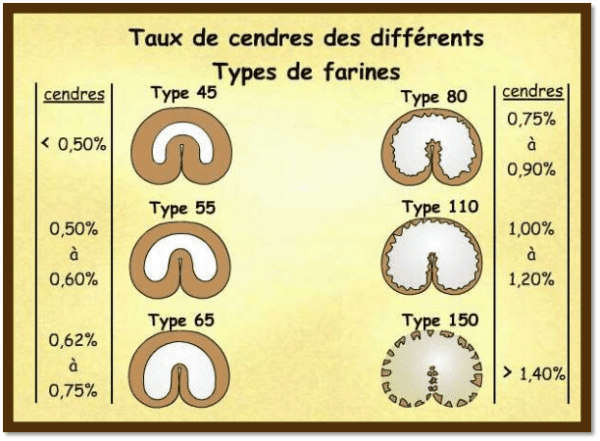
The type number refers to the amount mineral content. When the flour is tested, a precise amount of flour is baked at a very high temperature and the resulting “ash” or mineral content is measured (marked cendres above). For example a Type 55 flour will have between 0.5 and 0.6% of minerals for each 100 gr of flour. The lower the number, the whiter the flour. The higher the number the more complete or ‘wholemeal’ the flour.
How is French Flour different to British Flour?
It is relatively easy these days to buy flour milled from grain grown in the UK. However, traditionally much of our flour has been imported from countries Canada and the United States. These wheats are strong in protein. Gluten allows the gas generated by the yeast to be trapped in bubbles. The stronger the wheat the smaller the bubble and more water can be added. French flour is ‘softer’ and contains less gluten. It will contains grains only grown in France.
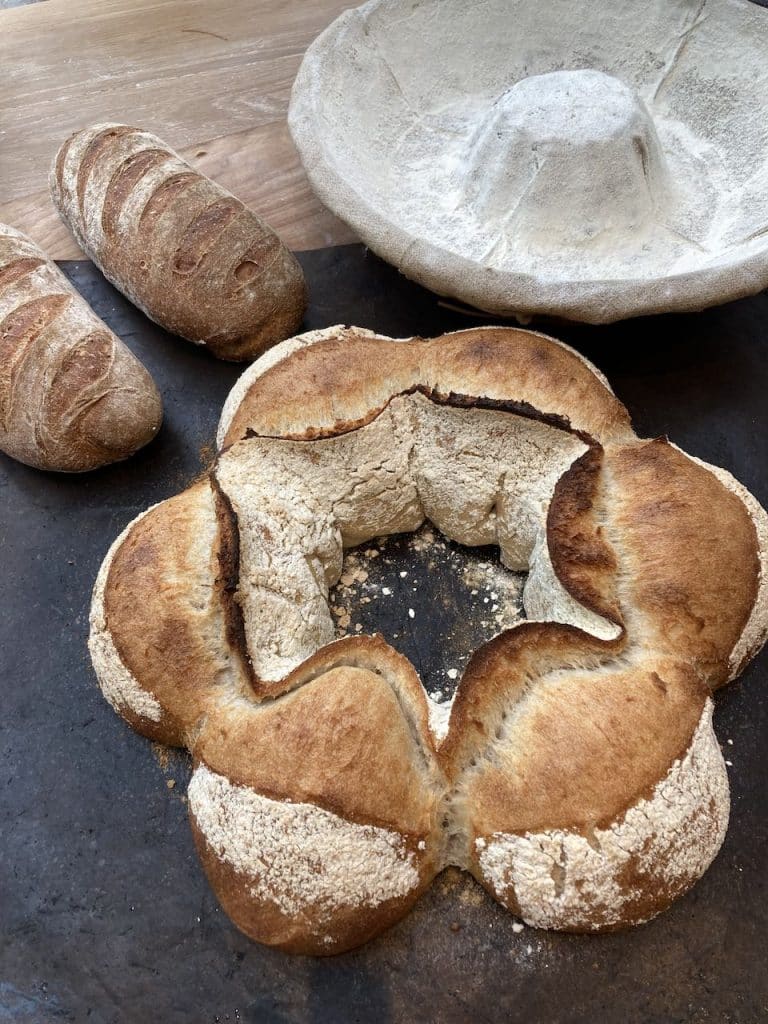
What part of the grain does the flour come from?
A grain of wheat is made of up three main components:
- Outer casing (13%). Mostly made of cellulose and minerals. The outer casing is removed during milling and becomes the bran
- Endosperm (84%) This is 70 to 75% starch and 10 to 12% proteins and a small amount of vitamins.
- Germ (3%) Rich in lipids, proteins, vitamins and essential minerals. Removed during milling to ensure longer life
Wholemeal flour uses all the grain, white flour just the endosperm. However, depending on the mill, the bran and germ might be removed and then added back in.
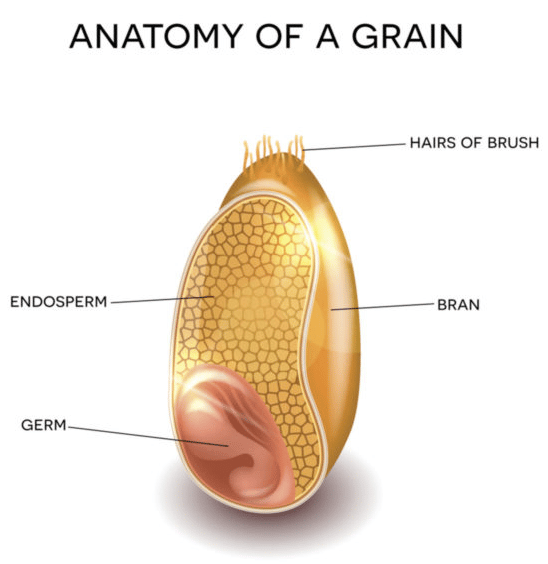
Why use French flour?
If you want to make really great baguettes and croissant, try French flour. You will notice the difference. It’s much easier to achieve those large ‘holes’ you love. The dough is will softer to work with, so require a little practice! It’s always best to autolyse first – pre-soaking.
What type of flour should I use?
-
- Type 45 – The whitest of flours. You’ll discover there are two types, one created specifically for croissants and brioches (sometimes called Gruau). The second is similar to sponge flour you might find in the supermarket. I use this flour for making scones and cakes with excellent results.
- Type 55 and Type 65 – These are typically used for bread making. I like to use Type 65 which has a slightly rougher feel and is my flour of choice for baguettes
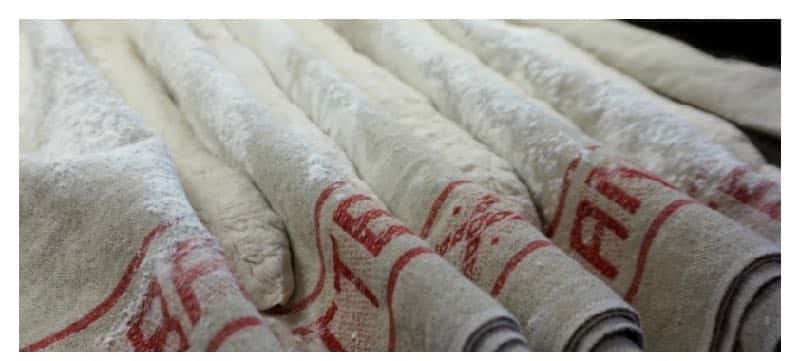
- Type 80 – This is a lovely flour, not white, not wholemeal but in between the two.
- Type 110 This is the designation for spelt flour just to confuse things!
- Type 150 – This is the wholemeal flour and ideal for rustic breads.
Where to buy French flour?
Some companies buy in French flour and rebrand it or sell it under the original brand name. Others buy in the wheat and mill it in the UK.
- Shipton Mill sell both Type 45 and Type 55 flour in small and large bags. Shipton Mill mill a mix of flours to create French Flour.
- Wessex Mill sell and Type 65
- Bakery Bits sell flour milled by Foricher in France. Types T45, T55, T65 , T110 and T150 are available. I’ve had the opportunity to visit the mill in France and can highly recommend the flour.
- Ratton Pantry also sell Foricher Flour and flour from Moulin St Martin – a wider selection than Bakery Bits now has.
- Matthews Cotswold Flour is made from French wheat milled in the Cotswolds.
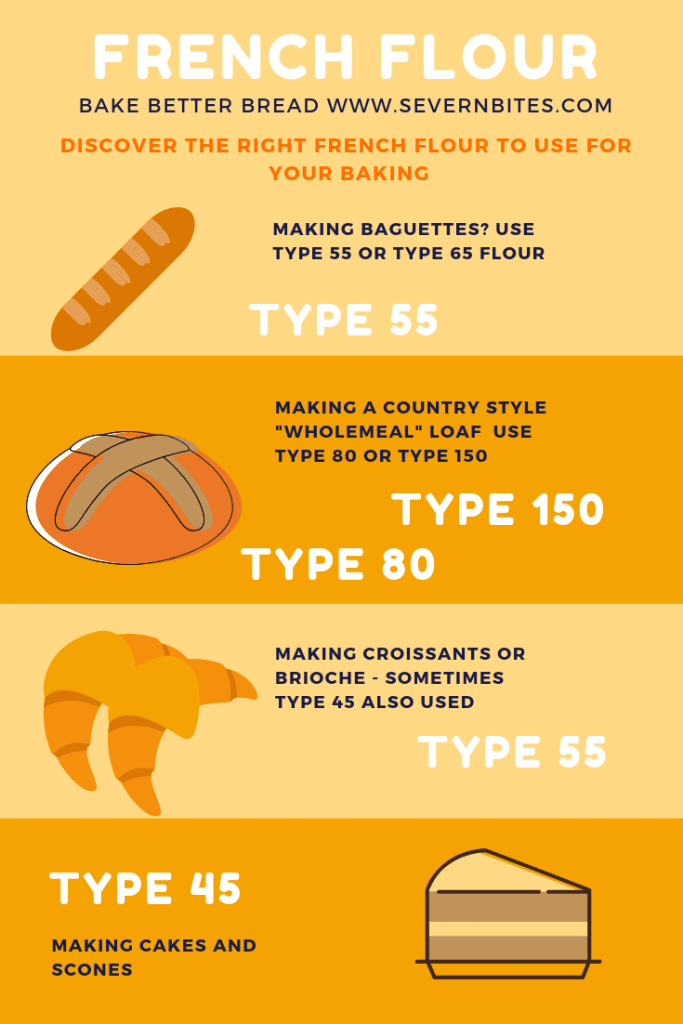
Discover the other posts in my Bake Better Bread Series including, importance of heat and steam; baker’s percentages, autolysing, fresh yeast and more.
Learn to Bake Bread
Learn how to make bread the French way in one of my breadmaking courses, there’s plenty to choose from including online classes which are bespoke.
Bake Better Bread – Autolyse – Why pre-soaking your dough will make all the difference

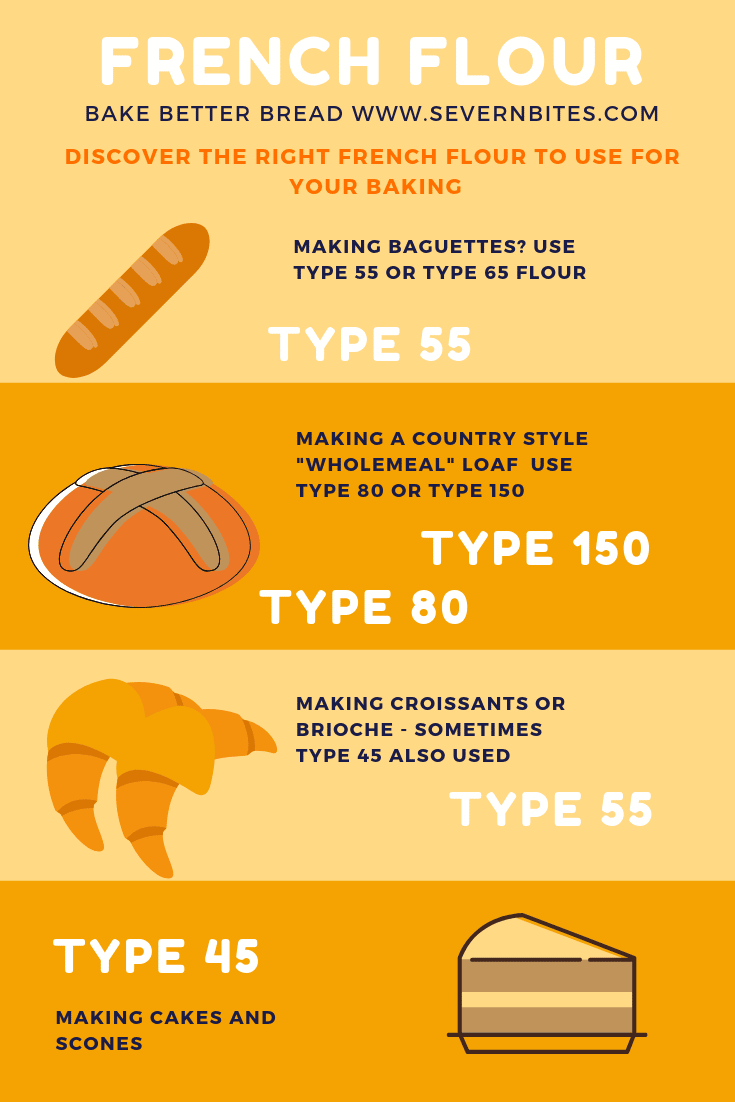
Hi Richard, It doesn’t need to be French flour! I think people forget that it isn’t just bread you should consider carefully, but all the other instances (eg biscuits) too. Time to make some of your own bread perhaps?
Thank you Danielle for your reply.
We shall take your advice and look into buying artisan bread made using 100% French flour. I suspect it may be the type of flour and additives generally used in the UK that may be causing the problem.
I followed the link you sent to the Real Bread Campaign site. There I read the letter from the government minister in reply to the Campaign’s concerns to improve the labelling of bread as to the description of ingredients and technques of bread-making, so as to better inform consumers. Judging by the minister’s response there seems to be no prospect of that, with phrases such as: “…legislative intervention is just one option and should be restricted to areas where there is clear market failure.” And, “We are keen to avoid creating further regulatory barriers to trade currently.” It is not about trade or market failure, but people’s healthy digestion that is of concern. I am still none the wiser as to why so many people, my wife included, have in recent years become intolerant to eating manufactured bread.
Hi Richard, I think the difference is more likely to be how the bread is made. If you avoid factory made and supermarket made bread and seek out an artisan baker here in the UK, I think that you’ll find your wife can eat the bread – especially sourdough. Artisan made bread has a much longer fermentation.
You might like to check out the Real Bread Campaign who are trying to get proper labelling mandatory.
On holiday in France last summer, my wife, who is sensitive to gluten, was able to eat bread and croissants galore without feeling unwell – as she does when eating the same here in the UK. I have found on the internet accounts by others who have had the same experience. What is it about French bread etc that seems not to cause such a reaction and why has it seemingly become such a widespread problem here in the UK, spawning a large and expanding ‘gluten free’ industry? No one seems to be asking questions of the food industry.
I just returned home from my first visit to France. I ate all the baked goods there and was never sick, add i am here in the States. I do hope i can source this flour for my home baking! Thank you for sharing this information in English!
Hi Ellie, I think you’d have to buy the flour online (as we do in the UK) here for example. But it looks as if Carrefour stock T65
Where do you find T80 or even T65 flour? I’ve been to three different Intermarché supermarkets (the only supermarkets anywhere near here in the Dordogne) and none of them has anything except T55.
Elaine, Your method sounds great to me! You are so lucky to have a choice of French flour. Try swapping 20% of your T65 flour for the T80 for something different.
I live in France and it took a long time to understand French flours. I am happy to buy baguettes from the boulangerie so the bread I make is more like British bread. The flour I use now (after trying many brands) is Melbio, which is milled in the Loire area. I use a T80 to feed my sourdough, and a T65 to make the loaves. I autolyse and do the final prove in the fridge overnight, and the bread rises well and has good texture and taste.
just after Lockdown I managed to get flour from a local company thet normally supplies restaurants . It was genuine French T55 the wrapper said “Farine de ble Type 55” really interesting working with it. Have always used strong Canadian wheat. Or when in USA King Arthur brand or from Walmar,t Robin Hood brand from Kansas. Two American flours using the names of English legends as their brand names – whats going on? Its like Be-Ro renaming itself Davy Crockett, and Homepride as Abe Lincoln
Lucky you having all that T45 flour. I really like it! You can even make croissants with it ….
omg life saver… just over order on T45 and was thinking i cannot eat that many loaf of brioche!
glad i can use it for cakes too and scones, something i want to make at home.
thanks for sharing this knowledge…